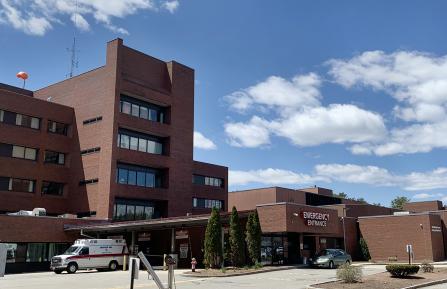If you are experiencing a medical emergency, please call 911.
Cheshire Medical Center’s Emergency Department is located at 580 Court Street in Keene, New Hampshire. Turn off the traffic circle into the medical center’s front entrance and turn left to the patient drop-off area and Emergency Department (ED) parking.
Our ED is open 24 hours a day, 7 days a week, 365 days a year. We treat all emergency patients regardless of their ability to pay. If you think you cannot pay for treatment, ask the registrar for financial assistance help when you arrive.
Poison or pills: If someone has swallowed too many pills or something poisonous, call the Northern New England Poison Control Center at 1-800-222-1222.
Emergency Department or Urgent Visit?
Visit our emergency room for very serious or life-threatening problems. To learn more visit Is It An Emergency?
If you have a common illness, like strep throat migraine, or a minor injury like a sprain or fracture, Cheshire’s urgent primary care visits may provide you faster and more affordable care. To get urgent primary care every day of the year, including holidays.
When should I call 911?
If someone is experiencing life-threatening symptoms, don't wait! Call 911 or transport them to the Emergency Department. If you call 911, emergency medicine professionals can give pre-hospital treatment immediately. This may save their life.
If you experience any of the following symptoms, you should call 911:
- Chest pain
- Coughing or vomiting blood
- Deep cuts or bleeding that won’t stop
- Difficulty breathing or shortness of breath
- High fevers
- Numbness in the face, arm, or leg
- Seizures
- Severe abdominal pain
- Severe burns
- Stroke
- Sudden blurred vision
- Sudden dizziness, weakness, or loss of coordination or balance
- Sudden, severe headache (not a migraine)
- Any other condition you believe is life-threatening
Sexual or violent assault
Medical care after an assault is essential to your health and safety. Our Medical Forensic Care Team are here to care for you in our Emergency Department any time of the day or night.
What to bring to the Emergency Department
We can provide you better care if you bring a list of these things:
- All current medications including “over the counter” drugs, herbal remedies, and supplements
- Include what dose you take of each medication, when you usually take them, and when the last time was you took each one.
- Any allergies or reactions to medications you have
- All surgeries you have had
- Any medical conditions you have
- Your primary care provider or regular doctor's name
Learn what to expect when you get here.
Triage: The most critically ill patients are treated first
Triage is a life-saving system that ensures patients with the most serious medical problems are treated first. This means:
- Someone who arrives after you will be treated before you if their medical problem is more serious or life-threatening than yours.
- You may not see critically ill patients who require priority treatment because they often arrive via ambulance.
- If your condition is not serious, you may receive more timely care by calling Urgent Primary Care Visits, open 365 days on floor 1A.
Triage nurses ask about your medical problem and do a short exam. They also ask about your medical history, allergies, and current medications. It is very important that you tell the triage nurse everything they need to know about your immediate problem and overall health.
We do not delay life-saving treatment: If a patient is critically ill, we may need to ask the required questions of the patient’s companion or ask the patient once they are stable and able to answer.
Zero tolerance policy
Cheshire Medical Center has a Zero Tolerance Policy for any type of aggression, including abusive language or verbal harassment, sexual harassment, threats of harm, or physical assault. Aggression may result in removal from the facility and/or prosecution.
If you witness any of the above behaviors, please tell a staff member or call security on an in-house phone. Dial 0 for the operator or 5555 directly, if the situation is urgent.

